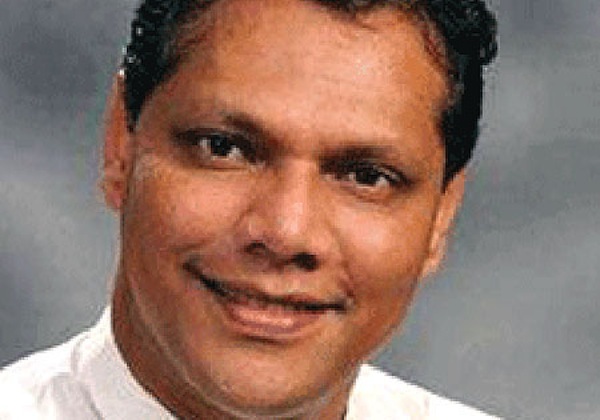
Photo courtesy The Nation
While I wish that Dayasiri Jayasekara had broken away from the UNP to form a new party rather than join the government, he has, I must admit, made a smart move, as has his new leader Mahinda Rajapaksa. The smart move was not to cross the floor and accept a cabinet portfolio but to move out to the provincial level. If Dayasiri is half the success that Gamini Jayawickrema Perera was as Chief Minister of the North Western Province (‘Wayamba’), the sky is the limit as far national political possibilities go, because he is young enough to outlast the shelf life of the ruling elite.
It is also a cannily played hand on the part of President Rajapaksa, who is more than aware of twin dangers within his coalition—from those who resent the glass ceiling imposed by family rule and are speculating about a comeback by their deposed queen, and the racist hardliners who are dismayed by the entirely pragmatic Presidential decision to proceed with the Northern Provincial election. Mahinda Rajapaksa seems to be inducting and building up a core of SLFP ‘young Turks’, some of whom are ex-UNPers.
By sandwiching the Northern election between two others, and by making it an interesting race with Dayasiri’s induction, the President has just diverted attention from the Northern controversy and more crucially, given the provincial council system a renewed local legitimacy.
Dayasiri Jayasekara was the canary in the mine-shaft. Let alone winning back the patriotic provincial and peasant voters, if the UNP cannot retain media-friendly, educated, urbanised, bilingual young professionals like Dayasiri, Shiral Laktilleke and Maithri Gooneratne, that party may become irrelevant and face electoral extinction.
Of the many factors that made Dayasiri make his move, two seem to stand out. Firstly, a loss of hope within a loss of hope: both in the UNP’s prospects and in his prospects within the UNP. Secondly, the fact that Mahinda Rajapaksa’s personal ‘pull factor’ not only vastly exceeds that of his rival’s but that it is exponentially enhanced by the latter’s ‘push factor’.
The photographs of Mahinda and Dayasiri at Temple Trees tell a story. Barack Obama said that Trayvon Martin “could have been me, 35 years ago”. When Mahinda Rajapaksa sees young populist politicians like Dayasiri Jayasekara he probably sees himself 25 years ago and when Dayasiri Jayasekara looks at Mahinda Rajapaksa, he probably sees himself 25 years hence. One can intuit the vibes. One can only speculate what Ranil Wickremesinghe sees when he sees Dayasiri Jayasekara and what Dayasiri sees when he sees Ranil Wickremesinghe.
Dayasiri Jayasekara’s valedictory address to Parliament showed us the truth that lies behind the walls of Sirikotha. The question must surely arise in the minds of the voters: if this is how the UNP leader treats his own party men, including its best vote getters, its human assets, how will he treat the country and its common citizens?
Sri Lankan politics displays the following deadlock: on the one hand, the citizenry (i.e. the electorate) at large is unwilling to vote for the UNP so long as it ignores the repeated electoral signals that an unpatriotic leader who was on the wrong side of a historic war is utterly unacceptable, while on the other, the UNP’s movers and shakers are unwilling to dump that leader overboard for the increasingly heavy deadweight he so manifestly is.
The question then remains as to why the UNP is not changing its leader and who or what factors and elements are propping him up. Ranil Wickremesinghe is supported by a dwindling, sticky amalgam of several social factors and elements: (a) the cringing conformist conservatism of some UNPers who regard him as a ‘toff’, ‘the guv’nor’, referring to him ludicrously as The Leader (Der Fuhrer); (b) a ‘peace NGO’-Colombo cosmopolitan civil society-Tamil Eelamist Diaspora element which commends him for the appeasement of the Tigers and sees the only electable alternatives within the party (Karu and Sajith) as ‘Sinhala chauvinists’; (c) the segment of the mass media that is owned by his extended family.
Their strategic idea seems to be that the Rajapaksa administration will be blown away by the two Big Es– the economy and the external—and that Ranil Wickremesinghe is not merely a recognised wizard at economic management, he is, as importantly or more so, the Fortunate Son (as John Fogerty and CCR sang) favoured by The Foreigners by whose hands we shall be delivered from the rule of the Rajapaksas.
Now that rule may turn or be increasingly wretched, and for sure the ship of state will hit the iceberg of economic crisis and external pressure. That is neither going to close the electoral gap nor make the UNP leader acceptable to the military (which is an indispensable factor in any transition). External impact does cause shifts but not as drastic as to override the factor of nationalist sentiment which may be heightened by such impact (hence the nomination and victory of Premadasa in ’88). In a Third World society, economic crisis hardly causes a swing to a pro-Fat Cat leader prone to radical privatisation.
As the provincial council election will be the latest to show, the Sri Lankan voter—especially post-war– will continue to punish the UNP as long as it fails to respect its collective wish for an Opposition leader who is patriotic and constitutes a patriotic alternative to the present incumbent. In short, the citizen wants to be doubly insured with a patriotic President and patriotic alternative/successor who is different and better in other (socioeconomic) respects. As long as the UNP’s socio-electorally toxic leader remains unchanged, he will doom the UNP to a slow death by a combination of suffocation of talent, haemorrhage of representatives and activists and chronic electoral shrinkage.